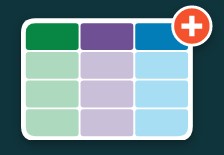These systems include the Universal Design for Learning model by CAST, which defines some guidelines to be implemented in teaching, based on scientific studies of human learning and adapting to individual needs so all students are able to improve their learning processes.
Based on the different backgrounds, needs, interests and strengths that each student might present, and the different functions of the brain parts involved in learning: recognition skills and strategies, and caring and prioritizing, Universal Design for Learning applies universal design principles of the building environment to get equal access to education for everyone, and eliminate the barriers that may face either if they have disabilities or not.
The main guidelines that this model introduces are the representation of contents in multiple media formats, different ways of expression of the acquired knowledge adapted to different levels, and give autonomy and trust to students, letting them get engaged in their education by their own.
You can check the specific guidelines of this model in the following link.
It is also interesting how this article analyses how other methods of adapting information may interfere, and how institutions and teaching staff can avoid it following some recommendations.








